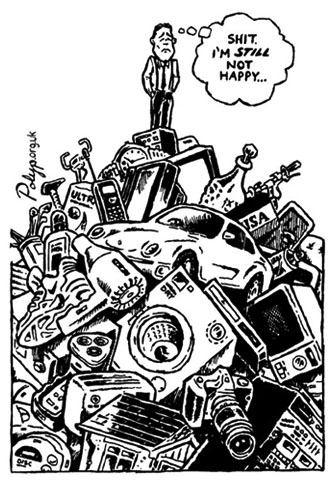Opinion
by Tony Orman
News that yet another mega store (K Mart) has come to town, did not thrill me. To the contrary, I groaned. But it did thrill others judging by reactions. In community papers, text messages indicated people were hysterically ecstatic and drooled that they were “thrilled” and “excited” at the “great news.”
Frankly to me, the welcoming reaction to yet another mega-store is symptomatic of a society addicted to consumerism – and rampant consumerism at that. We live in a time of absurdly cheap consumer goods, of continual sales and bargains and a dominance by big shopping chains and franchises. Witness the traditional Boxing Day sales where people queue, jostle and at times fight to get their hands on a “bargain.”
In the same breath society is told of funding shortages for hospitals, hospices, schools and public transport. We are told of the need to pursue growth via GDP. We are told we need more people to create demand. It is more and more, growth and more growth and like a dog chasing its tail, it never is satisfied. Western countries are in ”the grip of a collective psychological disorder” is how authors Clive Hamilton and Richard Denniss put it in their 2005 book “Affluenza”.
In a ”society surrounded by affluence, we indulge in the illusion we are deprived— the epidemic of over-consumption that pervades rich societies has been dubbed affluenza.”
One psychotherapist gave a clinical definition of the condition.
Sick Society
“The collective addictions, character flaws, psychological wounds, neuroses and behavioural disorders caused or exacerbated by the presence or desire for money/wealth—in individuals, it takes the form of a dysfunctional or unhealthy relationship with money, regardless of one’s socio-economic level. “
Affluenza is in essence, a confusion which arises because people fail to distinguish between wants and needs. The neo-liberal philosophy that arose with Roger-nomics of the Lange Labour government in the 1980s were about maximising growth of income and consumption of goods. It was an injection of greed into a society that was previously contented and relatively unstressed – and happier.
It in turn gave rise to longer working hours, the erosion of the basic income needed to run a family household with the consequence of both parents working and society experiencing increased stress levels. Society suffered with the rise in stress. Irrational behaviour became commonplace manifesting itself in a lack of common courtesy, aggressiveness, selfishness and anger fits, such as “road rage” emerging.
Cheap Import Delusion[home][
The ripple-like ramifications of affluenza and the rise of mega-shops are considerable.
Most of the goods are because of neo-liberal policies and a flood of cheap imported goods from China, South East Asia, India and other countries. Consequently New Zealand’s manufacturing resource languishes and dies, unable to compete with countries of origin cheap “slave” labour wages in those countries and the resulting bargain-bin prices.
I can buy a carpentry saw for $12 or so, made in South East Asia. But how many saws do I need? Personally I would rather buy a “well made NZ” saw for $30 or $40. Umbrellas are less than $10 – made in China. How many umbrellas do I need? I would rather pay $40 for a “well made NZ” one and thereby support local industry and lessen the country’s spending on unnecessary imports.
That’s why free trade agreements with countries such as China only force NZ to import more cheaply produced, often inferior goods for the consumer to drool over and snatch up and to the detriment of NZ’s manufacturing sector.
A country’s economy revolves very much around exports and imports. My very basic understanding is that exports are income, imports expenditure.
New Zealand strives to export branding itself as clean and green in an endeavour to appeal to the affluent overseas consumer. But cheaply produced imports flood in with no control under neo-liberalism. The result is New Zealand frequently operates with a deficit, i.e. loss – more import costs than export earnings.
It just doesn’t make sense whether we consider a regional perspective or New Zealand’s. The K Mart’s coming to town, is just symptomatic of the Affluenza Addiction.

